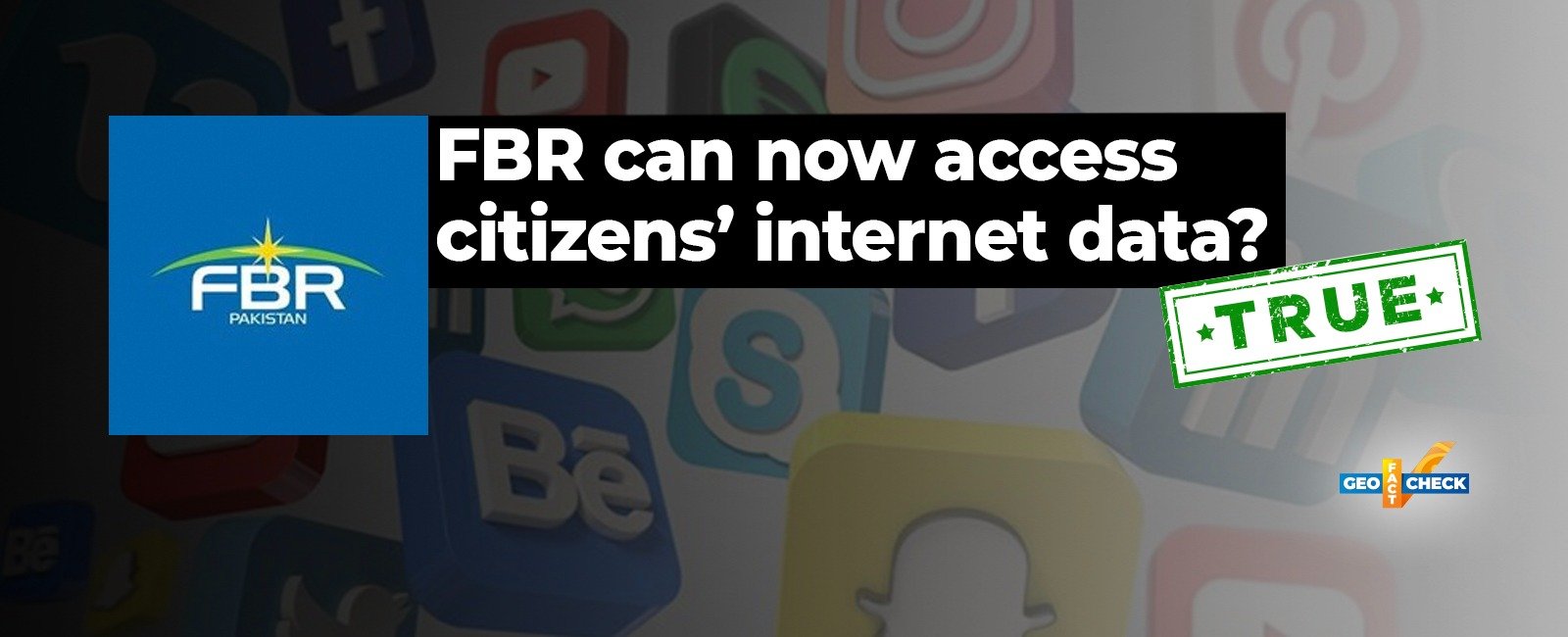Fact-check: True. FBR can now access citizens' internet data in tax fraud cases
New amendments permit FBR access to citizens' IP-related data which raises concerns about the potential misuse of this authority without proper judicial oversight

Pakistani social media users are circulating claims that recent changes to the tax law have granted the Federal Board of Revenue (FBR), Pakistan’s primary tax agency, access to the Internet Protocol (IP) data of citizens during tax fraud investigations.
The claim is true.
Claim
Posts on social media and WhatsApp allege that the FBR now has access to the internet data of Pakistani citizens.
“The Finance Act 2025 has allowed the FBR, in the investigation of tax frauds, to get access to the citizens’ internet data,” read a message circulating in WhatsApp groups, “This includes history from the Internet Service Providers (ISPs), Pakistan Telecommunication Authority (PTA) and other telecommunication companies.”
Fact
The government-run Federal Board of Revenue (FBR) does indeed have the authority after the passage of the Finance Act 2025, to access a person’s internet usage data, if the person is suspected of tax fraud, confirms the Act and an advocate of the Supreme Court of Pakistan.
The Finance Act 2025, gazette on June 29, has made several amendments to the Sales Tax Act 1990.
One such amendment to Section 38B of the 1990s law is the addition of sub-section (5), which permits the FBR to access an individual’s Internet Protocol data, directly from the Internet Service Providers, the state-run Pakistan Telecommunication Authority and private telecommunication companies.
Previously, the Sales Tax Act 1990 only allowed the FBR to demand documents or records from a person, department or organisation. The new sub-section expands that authority into the electronic sphere.
Below is the amendment made to the Act, while the Finance Act 2025 can be read here:
Relevant Section | The Sales Tax Act 1990 | After Amendment |
| 38B | (1) “Notwithstanding anything contained in this Act or any other law for the time being in force, any person required to maintain the record under the Act, on demand by an officer, not below the rank of [an Assistant] [Commissioner Inland Revenue], by notice in writing, as and when specified in the notice, shall, (a) produce for examination, such documents or records which the officer of [Inland Revenue] considers necessary or relevant to the audit, inquiry or investigation under the Act;
(b) allow the officer of [Inland Revenue] to take extracts from or copies of such documents or records; and
(c) appear before the officer of [Inland Revenue] and answer any question put to him concerning the documents and records relating to the audit or inquiry or investigation referred to in clause (a) above.
(2) An officer of [Inland Revenue] conducting an audit, inquiry or, as the case may be, an investigation under the Act, may require in writing any person, department, company or organization to furnish such information as is held by that person, department, company or organization, which, in the opinion of the officer of [Inland Revenue], is relevant to such audit, inquiry or investigation.
(3) The Board may require, in writing, any person, department, company or organization, as the case may be, to provide any information or data held by that person, department, company or organization, which, in the opinion of the Board, is required for purposes of formulation of policy or administering the Customs, Sales Tax, Federal Excise or Income Tax.
(4) Every person, department, company or organization shall furnish the information requisitioned by the Board or the officer of Sales Tax under sub-section (2) or (3), within the time specified in the notice issued by the Board or, as the case may be, the officer of [Inland Revenue].” | Addition of new sub-section 5 in Section 38B of the Sales Tax Act 1990 under the Finance Act 2025
(5) “Notwithstanding anything contained in any other law for the time being in force, the Commissioner may, by notice in writing, require any Internet Service Providers, Telecommunication Companies and Pakistan Telecommunication Authority, to furnish subscriber’s information pertaining to the Internet Protocols in connection with any inquiry or investigation in cases of tax fraud, as may be specified in such notice.” |
Saqib Jillani, a Supreme Court advocate, also confirmed to Geo Fact Check that the new amendment allows FBR access to citizens' IP data without court approval. He expressed concern over the potential for misuse in the absence of judicial oversight.
“Privacy is a fundamental right in our constitution and this section violates privacy. Of course, there are expectations when there are concerns of national security or there is clear-cut evidence that there has been tax fraud, but court supervision is mandatory,” he added, “In my opinion, this section is unconstitutional as it does not have adequate safeguards and checks against abuse.”
Verdict: The FBR now has legal authority to access IP data of citizens during tax fraud investigations, following amendment made to Section 38B of the Sales Tax Act 1990 under the Finance Act 2025.
Follow us on @GeoFactCheck on X (Twitter) and @geo_factcheck on Instagram. If our readers detect any errors, we encourage them to contact us at [email protected]





